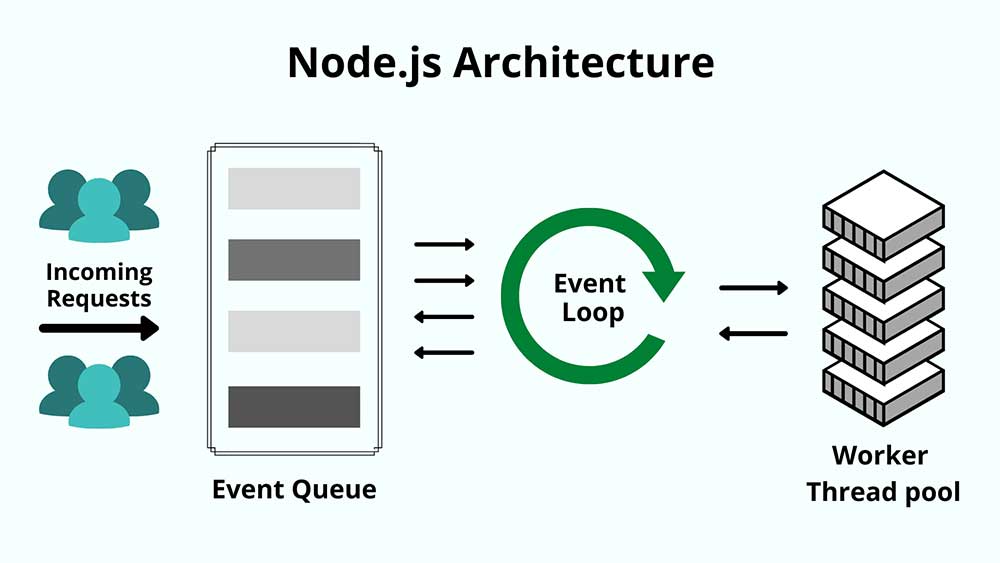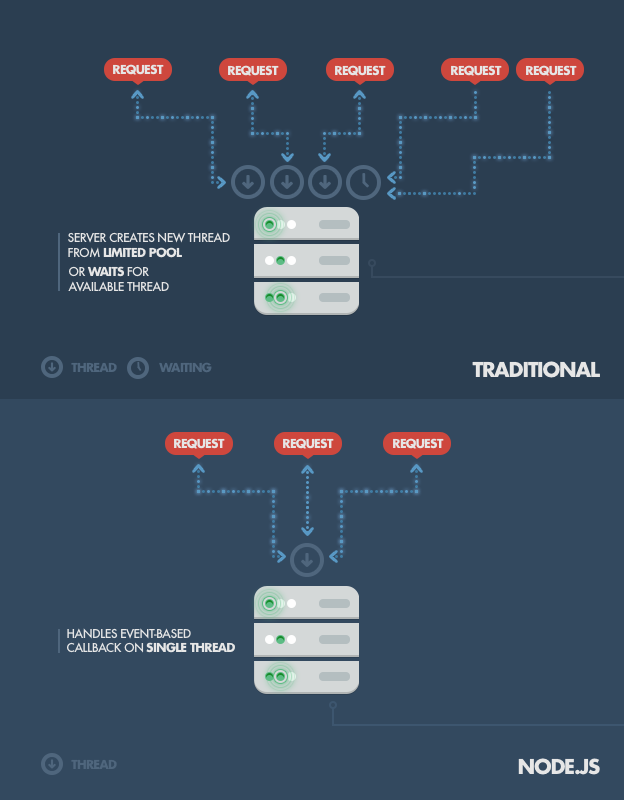Why is Nodejs better than Other Languages?
Quick Summary: You are always thinking about NodeJs; what makes it different and popular from other programming languages? Why are big companies like Netflix, PayPal, Twitter, and LinkedIn using Node.JS for building their application? Get all your answers here… read below!
Introduction
Today’s businesses are adopting ways to build scalable and real-time applications. These applications need to be able to handle a large number of concurrent users and requests, and they need to be able to respond to events in real-time. In such a case, Node js is the perfect option for building these applications.
Additionally, if you are looking for efficient, scalable, reliable, and real-time applications, there’s no better choice than Node.js.
Yes, you read it right. With Expert Node.js Development Services, you can build the best software. Moreover, you can also think about Hire Node.js Developers.
NodeJS is the all-in-one solution for all software development requirements.
Wondering! How and why?
Read thoroughly and understand…
Overview to NodeJS
Ryan Dahl originated Node.Js 2009, intending to bring server-side competencies to JavaScript.
However, the definition of Node js is quite complex. Node Js is not a programming language, nor is it a framework or a library. The official website of Node.js defines it as a JavaScript runtime that builds on Chrome’s V8 JavaScript engine.
Node.js is a programming language that people may refer to as a technology. Developers mostly use it for back-end operations. And it can also be used with Front-end JavaScript frameworks like Angular, React, and Vue. Furthermore, the design of Node.js is comparable to Ruby’s EventMachine and Python’s Twisted.
Moreover, developers have rapidly adopted Node.JS due to its continuous improvements that have increased its usage. Node.JS being written in JavaScript, makes it a suggestive framework that allows developers to handle the back-end of web applications without the need for PHP, Java, Ruby, or Python. In addition, it combines the front-end and back-end development technologies by executing the application with its runtime on the server.
Pros Of NodeJS
Asynchronous event-Driven I/O
It makes Node.JS very efficient at handling concurrent requests, as it does not have to wait for one finish before starting another.
Single-Threaded
It is lightweight, as only one thread has to be managed.
JavaScrip
Node JS uses JavaScript, Which is a popular and well-known language. Additionally, JavaScript makes using and learning Node.JS for developers simple.
Large Community
Its huge community provides endless support to Node.JS developers.
Wide Range Of Modules
Numerous modules are available for Node.JS, making it a versatile platform for building various applications
Other Advantages
- Any CPU-intensive computation will block Node.js; therefore, using a threaded platform is preferable. Alternatively, you may scale the calculation out.
- Using Node.js with a relational database is still quite a pain (see below for more detail).
- Pick up any other environment, such as Rails, Django, Python., or Java MVC, if you want to try to perform relational operations.
Benefits of Node.js over other technology?
Aside from being effective at what it does, Node.js is popular because it has a huge, active, open-source, JavaScript-based ecosystem. Also, it doesn’t tend to break compatibility between versions in significant ways
- The scalability provided.
- Node.js is light and fast.
- Many hosting providers are available.
- Highly extensible.
- Its caching ability.
- Node.js is simple to learn.
- The process of coding and development is easy to understand.
- It comes with caching capabilities.
- It is extensive.
Examples of Node.js Apps
Developers mainly prefer Node.JS for creating desktop and mobile apps that require seamless operations and large amounts of connections. In that context, many popular apps have switched to Node.JS after using other runtime environments.
Netflix
It is the world’s leading streaming service, with over 150 million subscribers covering 190 countries. It offers ample films and series, including in-house production. Besides, when it comes to streaming enormous amounts of information to millions of users, Node.JS goes best! It has helped Netflix to go smoothly with massive traffic alone.
It is a popular social media platform that has 330 monthly active users. It is among one of the ten websites most visited in the world. Twitter switched to Node.JS, allowing it to make rapid changes and deploy faster. Moreover, it has helped the company to move quicker and scale easily.
Uber
It is a ride-hailing platform that is present internationally in 700 cities and 65 nations. Uber has served over 110 million users and has 3 million drivers. The reason for Uber to consider Node.JS is it makes the application more responsive and has real-time potential.
Slack
As a collaborative tool, it has dramatically facilitated seamless communication among individuals. Slack has more than 12 million active users that some leading companies like NASA, Airbnb, and eBay use. Slack uses Node.JS due to the event-based architecture function that makes it ideal for real-time applications.
Coursera
The online course provider partners with top universities and organizations to offer courses, certificates, and degrees. Coursera needed a JavaScript framework that allows faster and easily scalable development. Therefore, Node.JS was the best choice as it is lightweight and tackles a wealth of modules to offer various features in the app.
How Does It Work?

Node.js is the JavaScript runtime environment that is based on Google’s V8 Engine.
i.e. with the help of Node.js, we can run the JavaScript outside of the browser.
Another thing that you may or may not have read about Node.js is that it is single-threaded.
Based on event-driven architecture, and non-blocking based on the I/O model.
Why is Nodejs so popular?
1. The V8 libraries are built on an incredibly powerful virtual machine
Node.js is a bundled version of Google’s V8 JavaScript engine, the libuv platform abstraction layer, and a core library written mostly in JavaScript.” It’s also worth noting that Ryan Dahl, the Node.js founder, was attempting to create real-time websites with push functionality. He provides developers a tool to work in the non-blocking, event-driven I/O paradigm with Node.js.
Event-driven asynchronous callbacks.
To understand why Node.js applications have to be written this way, we need to understand how Node.js executes code. Node’s approach isn’t unique, but the underlying execution model is different from runtime environments like Python, Ruby, PHP, or Java.
3. NPM: The Node Package Manager
The idea of NPM modules is quite similar to that of Ruby Gems: a set of publicly available, reusable components, available through easy installation via an online repository, with version and dependency management.
A full list of packaged modules can be found on the NPM website or accessed using the NPM CLI tool that automatically gets installed with Node.js. The module ecosystem is open to all, and anyone can publish their module that will be listed in the NPM repository.
Some of the most popular NPM modules today are:
- express – Express.js, a Sinatra-inspired web development framework for Node.js, and the de-facto standard for the majority of Node.js benefits out there today.
- socket.io and sockjs – Server-side components of the two most common WebSockets components out there today.
- Jade – One of the popular templating engines, inspired by HAML, a default in Express.js.
- mongo and mongojs – MongoDB wrappers to provide the API for MongoDB object databases in Node.js.
- Redis – Redis client library.
- coffee-script – CoffeeScript compiler that allows developers to write their Node.js programs using Coffee.
Where Nodejs Can Be Used?
- Server-side programming
- Mobile App Development
- Back-end API services
- Web application
Analyzing Node.js vs other programming languages
Of course, there are lots of different languages out there to choose from, and each one will bring something different to your project or application. To help you decide, we’ve put together a comparison of Node.js and some of the main alternatives available.
1. Node.js vs Python
Python is an object-oriented, high-level, interpreted programming language with a focus on readability and productivity. It was founded in 1991 and supports a number of programming paradigms, making it an excellent solution for a wide range of commercial operations. As a result, it is simple to use and create, with a large standard library and environment.
This makes Python perfect for CPU-intensive apps, which, as we’ve seen, aren’t a strong suit for Node.js. Python also has the upper hand when it comes to time-sensitive development and deployment options. You won’t need to look for numerous utility modules and packages for your application because it comes with a vast standard library and modules.
Instead, you can start working on the project right now.
In addition, Node’s power in handling heavy I/O operations and shuffling of data between the front end and the back end makes it the better choice for Single Page Applications and Real-Time Applications.
2. Node.js vs Java
Web apps, mobile apps, real-time applications (instant messaging, live chat), online gaming apps, e-commerce transaction software, and more can all benefit from Node.js.
It’s also a smart choice if you’re working with microservice architecture, which can serve as the foundation for more complex systems – remember, Node.js was used to create apps like Netflix and Uber.
Java, on the other hand, is ideal for CPU-intensive or CPU-bound applications. The same is true for programs with a large codebase: because Java uses tightly typed sources, refactoring and bug fixing will be easier during maintenance.
Java is a wonderful choice if your application employs an RDBMS (Relational Database Management System) since it offers capabilities that facilitate multi-database object-relational mapping.
Nodejs vs Other Technology Architecture?

Pros of Nodejs:
If your application doesn’t have any CPU-intensive computation, you can build it in Javascript top-to-bottom, even down to the database level if you use JSON storage Object DB like MongoDB.
This eases development (including hiring) significantly.
Crawlers get a fully rendered HTML response, which is considerably more SEO-friendly than, say, a Single Page Application or a Node. js-based websockets app.
Cons of Nodejs:
Any CPU-intensive computation will block Node.js, therefore using a threaded platform is preferable. Alternatively, you may scale the computation out.
Using Node.js with a relational database is still quite a pain (see below for more detail).
Pick up any other environment, such as Rails, Django, Python., or Java MVC if you want to try to perform relational operations.
In Conclusion:
We already know that Nodejs and other languages such as Python and Java have advantages and disadvantages and that they are utilized for various types of projects.
So, when deciding between Node.js and other languages like Python, Java, weigh.
All of the benefits and drawbacks to choosing which is ideal for your project application.
FAQ
Why use Node.JS?
It is cross-platform with an open-source runtime environment that can run web applications outside the client’s browser. Moreover, it has rapid and scalable development with vast ecosystem modules to make development easier.
Is Node.JS good for back-end development?
Node.JS is hugely used for the back-end development of applications. Furthermore, Node.js is widely employed as a server-side programming language, offering non-blocking, event-driven servers similar to typical websites and back-end API services.
Is Node.JS faster?
Node.JS has quick servers and a simple API that makes the run in under a minute. Moreover, it is ideal for developers to construct microservice environments as they are linked to multiple APIs together due to the simplicity of creating an API in Node.
Is node js easier than Python?
Yes, Node Js is easier than Python. While both have their strengths, Node.JS can be seen as more accessible due to its consistent language for both Front-end and back-end development. Its asynchronous nature and the vast library of packages make it efficient and developer-friendly. This versatility makes Node.JS an appealing choice for modern web applications.
Is NodeJS back-end or front-end?
Yes, Node Js is easier than Python. While both have their strengths, Node.JS can be seen as more accessible due to its consistent language for both Front-end and back-end development. Its asynchronous nature and the vast library of packages make it efficient and developer-friendly. This versatility makes Node.JS an appealing choice for modern web applications.













